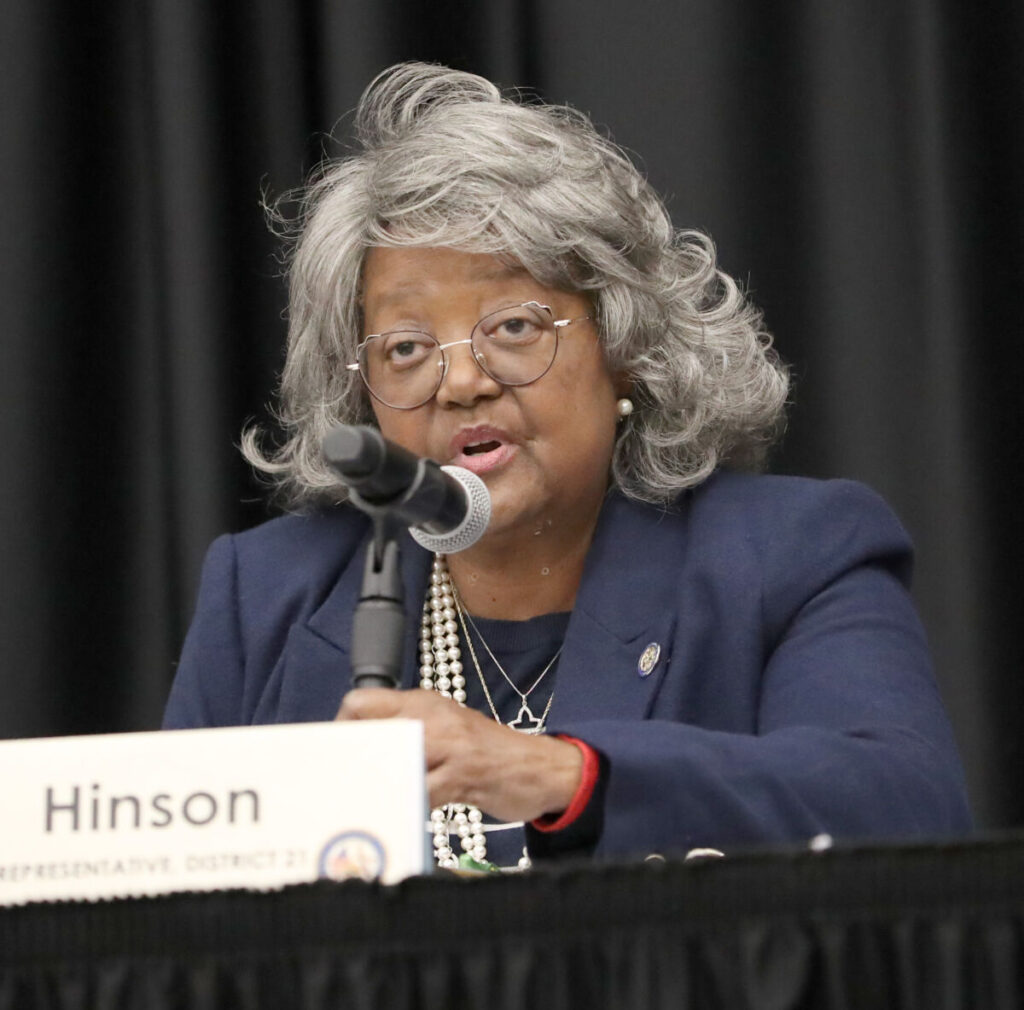On being woke

Rep. Yvonne Hayes Hinson speaks during the Marion County Delegation at the Klein Conference Center at the College of Central Florida in Ocala, Fla. on Friday, Jan. 6, 2023. [Bruce Ackerman/Ocala Gazette] 2022.
I have said this before, and I will say it again: Florida is not the free state and “Woke” will never die; not in Florida and not in the world.
We are only a few weeks into 2023 and already several attacks have been launched on educational freedom, especially regarding Black History, but also regarding public schools and viewpoint diversity on college campuses.
On January 20th, the Governor released a statement saying he rejected the new AP African American History class proposed by the College Board. His reason was that it violated Florida laws by imposing a “political agenda” on students.
The political agenda is the mass incarceration of Black Americans, critical race theory, Black Queer Theory, Black Feminism and the Movement for Black Lives and “Woke” ideology. What he is dismissing as political agenda is the harsh reality of Black History and American History. It is not a political agenda when it involves human rights.
Limiting Black History is akin to limiting our civil rights. As someone who has stood up to racism during the Civil Rights Era, I know when our history is being subverted. I have picketed against segregated buildings. I have stood up to lunch counters who refused to serve Black people. This is nothing short of the same mentality of the ‘60s and its attempt to disguise racism by claiming that a course in Black history “lacks educational value.” Creating a legal pretext by passing unjust, unconstitutional laws of choice by one man does not make it legal nor just.
AP US History is the only other Advanced Placement level course that mentions Black History. However, the content in that course pertaining to Black History is shallow and only explores it through a colonial lens. Students deserve a chance to learn about the African diaspora and examine Black culture in greater depth. Black children who still experience racism and microaggressions in classrooms today deserve to have a course that thoroughly explores their background, the history of racism, and the nuance of systemic discrimination.
Advanced Placement courses are meant to be college preparatory, discuss heavy topics and the dark, ugly sides to Black History are revealed because it deals with the oppression of an entire race. High school students who sign up for any AP course are prepared for these discussions, and the state has no place impeding on their individual right to knowledge.
This is not the only attack on our schools.
There is a political agenda to privatize our public-school systems with the filing of HB 1. This bill uses taxpayers’ money to grant vouchers for people to switch to a private school. Money that should be going toward strengthening our public schools is instead going toward incentivizing people to transfer to private schools – a ploy that will ultimately divide Florida students, transfer taxpayers’ money without accountability and ultimately create the freedom to defraud the citizens of Florida.
Moving toward private education for students is not sustainable to give all our children a free and enriching education. This bill is disguised as a “school-choice” bill, but it is not a choice for students or their parents. Private schools can choose who they want to admit, who teaches their courses, and what content to teach their students. Private institutions – who control almost all aspects of how they want their school operated – are bound to only admit students who meet their school’s image. Where are the provisions in this bill that say that private schools cannot discriminate against students for their race, culture, ethnicity, sexual orientation, gender identity, nationality, or religion?
Should a voucher student choose to go to a private school, there’s a possibility that they can be dismissed from the school at any point. If those students return to the public school system, there is no way to assess if they are on grade level or following a curriculum that meets state standards. That is a burden on our teachers, who are already severely underpaid, to help those students catch up to their peers.
The bill claims that low-income students will receive these vouchers first. However, these vouchers may not cover the full cost of tuition. Students are not permitted to receive vouchers over $24,000*, and often, the tuition of a private school exceeds that. If these vouchers really give preference to low-income families, how would these families be able to afford the remaining balance to put their child in a private school? Moreover, there is no outreach plan on how they may promote these vouchers to low-income students. This bill is not meant to bring students of different backgrounds together; it is meant to divide them.
Vouchers should be applied on case-by-case basis. Using taxpayer money to create universal vouchers and remove almost all provisions of the Family Empowerment Scholarship Program would allow virtually any family to use state funds to place their children in private education programs.
As Black History Month approaches, we ought to be celebrating Black accomplishments over the years and teaching our children about the hard work of people who fought against oppression and made their voices heard. Instead, our history is being limited, the right to public education is being limited, and our rights, teachers’ rights, colleges’ and professors’ rights and our children’s rights are being limited.
Stay Woke!





